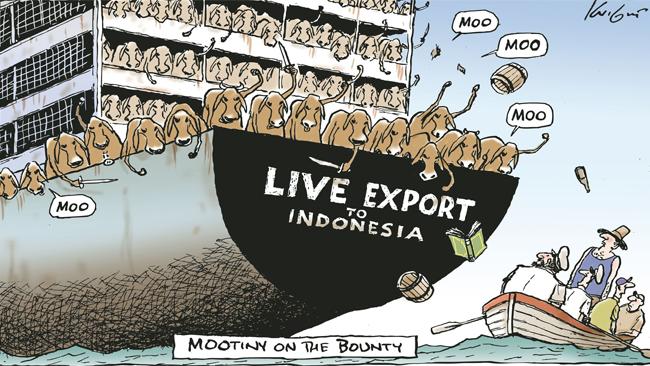Indonesia could stall trade negotiations

ABC | 19 Nov 2013
Indonesia could stall trade negotiations
Australia and Indonesia are in the middle of negotiating what’s arguably the most important trade agreement in the history of the two countries’ cooperation. But there are fears Indonesia could stall the trade negotiations because of the diplomatic run-in between Jakarta and Canberra.
Martin Cuddihy
– Audio : http://mpegmedia.abc.net.au/news/audio/pm/201311/20131119-pm04-trade-indon.mp3
– Transcript :
MARK COLVIN : Australia and Indonesia are in the middle of negotiating what’s arguably the most important trade agreement in the history of the two countries’ cooperation.
It’s known as a comprehensive economic partnership agreement, or CEPA. It goes further than a free trade agreement, with negotiations on intellectual property, bilateral investment and services.
But there are fears that Indonesia could now stall the trade negotiations because of the diplomatic run-in between Jakarta and Canberra and there could be implications for one contentious but lucrative trade.
Peter McCawley is a visiting fellow at the Australian National University and former head of the university’s Indonesia project.
He spoke to Martin Cuddihy.
PETER MCCAWLEY : The discussions over the so-called CEPA, comprehensive economic partnership agreement, have been going on in the background for three or four years now, but these things are slow-moving, especially with a large document. It’s a large document with many clauses and sub-clauses, and you really need a lot of discussion and a lot of the issues are fairly controversial.
Now that the Indonesian government has announced that they’re taking a look at issues that are areas of cooperation between the two governments, one would have to guess that there’s a real possibility that this will be slowed down now.
MARTIN CUDDIHY : What would Australia stand to gain from an agreement such as this one ?
PETER MCCAWLEY : An agreement like this brings quite a few benefits, and perhaps the single most important benefit - this is a vague one - but the single most important benefit is that a broad document like this serves as a very broad platform for discussions about all sorts of economic matters.
MARTIN CUDDIHY : So why do you think it is at risk now, or why do you think that this process will be drawn out considerably ?
PETER MCCAWLEY : A quite traditional way for any government to indicate displeasure in a situation like this is to look down the list of items that are being discussed, bilateral discussions, and simply put them on hold for a while, slow them up, and we can’t be certain exactly what areas Indonesia will slow up.
But it’s Australia that is keener, more eager to pursue this comprehensive economic partnership agreement than Indonesia, and so from Indonesia’s point of view, it’s a good way of giving the Australian Government a bit of a prod and saying look, if you want to discuss these sorts of things with us, you have to bear in mind that we can go easy, we can slow it up at any time. It would be very unsurprising if they did that.
MARTIN CUDDIHY : Now one of the most contentious trade arrangements between Australia and Indonesia is of course the live export of cattle. Do you think that this breakdown in the relationship between the two countries could have an effect on the live export trade ?
PETER MCCAWLEY : Well it clearly could have an effect. We can’t tell, but that’s a good example in a way of the sorts of problems that flow from a broader breakdown when, say, an ambassador is temporarily, hopefully temporarily, withdrawn as the Indonesian ambassador now has.
To settle all of these sorts of things, and the trade in cattle is just one example, you really need lots of discussions at the industry level. The business people need to get together and talk about it, and the officials need to get together and talk about it.
There are different government agencies involved : you’ve got the agriculture people involved, you’ve got the trade people involved. These meetings are the sort of bread and butter of keeping economic relationships going, because there are lots of little hiccups and it’s when there are regular meetings it makes it possible to smooth over the hiccups.
I mean, we should not, we must understand that there are costs to this and that the Indonesian side is capable of inflicting considerable costs on the Australian side. We have to understand that : there are consequences.
MARK COLVIN : Peter McCawley, a visiting fellow at the Australian National University, speaking to Martin Cuddihy.





